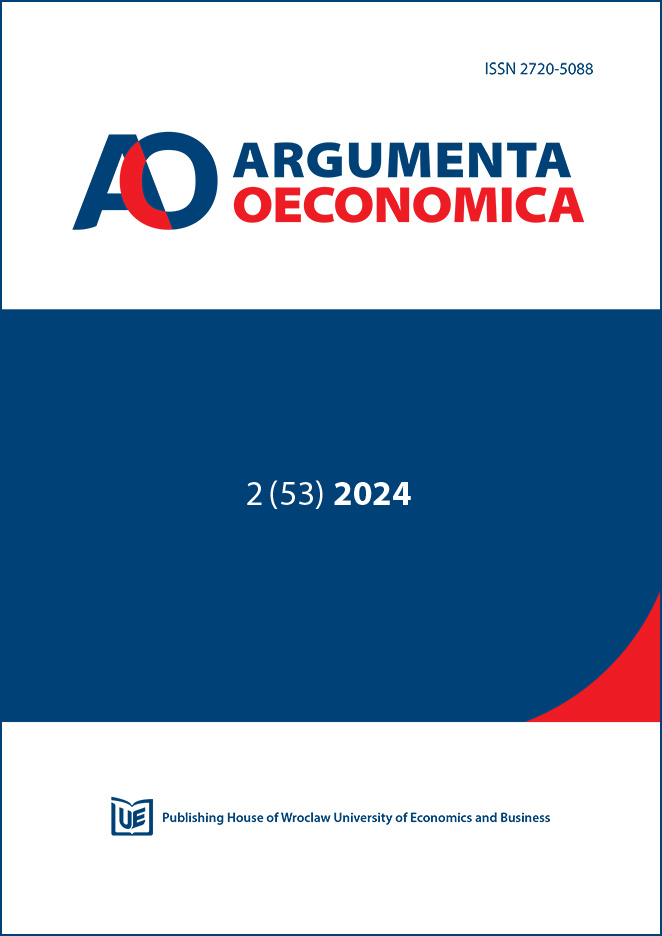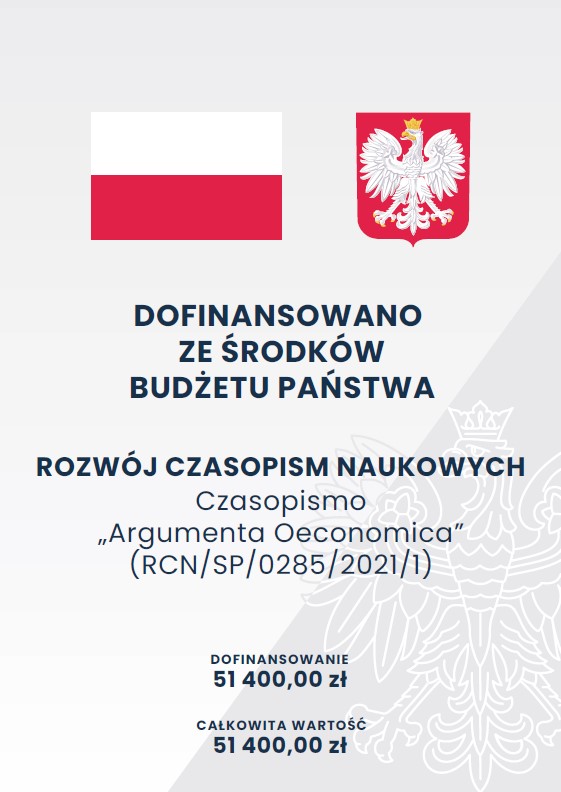The impact of economic and behavioural factors on the shaping of international relations with the Russian Federation. A comparative analysis of Poland and Germany
Keywords:
Polish-Russian relations, German-Russian relations, economic and behavioural factors in shaping international relations, Russian Federation (RF), international political economy (IPE)Abstract
Research background: The article addressed the importance of economic and behavioural factors in shaping relations between states. This significance was examined in the context of the possibility of building the power and strength of the state, ensuring economic security, and in particular energy security.
Purpose of the article: The aim of the article was to identify the main economic and behavioural dependencies of the diverse attitudes of Poland and Germany towards the Russian Federation, and to determine the impact of these dependencies on these attitudes.
Methods: The research methods and techniques included: elementary analysis, desk research, causeand-effect analysis, and selected qualitative and quantitative analysis methods.
Findings and value added: The obtained results are important for international political economy and geoeconomics. The study covered the economic and behavioural factors determining the relations between Poland and the Russian Federation as well as those between Germany and the Russian Federation. The results of the comparison of these two categories of bilateral relations explain the different attitudes of Poland and Germany towards the Russian Federation, which was particularly visible in the context of the Russian aggression against Ukraine and contribute to reducing the research gap in this thematic area.
Downloads
References
Adamczyk-Kowalczuk, M. (2022). Behawioralne determinanty decyzji inwestycyjnych na rynku kapitałowym. PWE.
Alpert, M., & Raiffa, H. (1982). A progress report on the training of probability assessors. In D. Kahneman, P. Slovic, & A. Tversky (eds.), Judgment under uncertainty: Heuristics and biases. Cambridge University Press.
Bąbel, P., & Ostaszewski, P. (eds.) (2021). Współczesna psychologia behawioralna. Wydawnictwo Uniwersytetu Jagiellońskiego. Burnewicz, J. (2021). Filozofia i metodologia nauk ekonomicznych. Wydawnictwo Naukowe PWN.
Bieleń, S. (2015). Tożsamość uczestników stosunków międzynarodowych. In R. Zięba, S. Bieleń, & J. Zając (eds.), Teorie i podejścia badawcze w nauce o stosunkach międzynarodowych. Wydział Dziennikarstwa i Nauk Politycznych Uniwersytetu Warszawskiego.
Blackwill, R. D., & Harris, J. M. (2016). War by other means geoeconomics and statecraft. The Belknap Press of Harvard University Press.
Chavagneux, C. (2001). Economics and politics: Some bad reasons for a divorce. Review of International Political Economy, 8(4), 609-632.
Cline, R. S. (1994). The power of nations in the 1990s: A strategic assessment. Lanham. Cooper, R. N. (2005). The breaking of nations. Order and chaos in the twenty-first century. Wydawnictwo Media Rodzina.
Cooper, R. N. (1968). The economics of interdependence: Economic policy in the Atlantic Community. Columbia University Press.
Drewes, A. (2021). Metodologia badań naukowych. KS OmniScriptum Publishing.
Eurostat, https://ec.europa.eu/eurostat
Frączyk J. (2021). Polska spadła w rankingu gospodarek świata. W pandemii wyprzedził nas kraj z sankcjami USA. Business Insider. https://businessinsider.com.pl/finanse/makroekonomia/mfw-polska-spadla-w-rankingu-gospodarek-swiata-wpandemii-wyprzedzil-nas-kraj-z/d5wgxxp (access: 02.08.2022).
Gilpin, R. (1987). The political economy of international relations. Princeton University.
Główny Urząd Statystyczny. https://stat.gov.pl
Green, E. M. (1996). Economic security and high technology competition in an age of transition: The case of the semiconductor industry. Praeger Publishers.
Grosse, T. G. (2014). W poszukiwaniu geoekonomii w Europie. Instytut Studiów Politycznych PAN.
Haliżak, E. (1997). Ekonomiczny wymiar bezpieczeństwa narodowego i międzynarodowego. In D. B. Bobrow, E. Haliżak, & R. Zięba (eds.), Bezpieczeństwo narodowe i międzynarodowe u schyłku XX wieku. Wydawnictwo Naukowe Scholar.
Jean, C. (2003). Geopolityka. Zakład Narodowy Wrocław im. Ossolińskich.
Kennedy, P. (1994). Mocarstwa świata – narodziny, rozkwit, upadek. Książka i Wiedza. Instytutu Nauk Politycznych Uniwersytetu Kazimierza Wielkiego w Bydgoszczy, Wydawnictwo Adam Marszałek.
Kleinowski, M. (2010). Czynniki budujące siłę i potęgę państwa na arenie międzynarodowej. Świat Idei i Polityki, Rocznik
Keohane, R. O., & Nye, J. S. (1971). Transnational relations and the world politics. International Organization, University of Wisconsin Press, 25(3), pp. 329-349.
Kożak-Siara, T., & Majkowska, J. (2018). Determinanty bezpieczeństwa ekonomicznego państwa. Współczesne Problemy Zarządzania, 6(1(12)), 129-149. https://doi.org/10.52934/wpz.110
Leszczyńska, M. (2018). Bezpieczeństwo ekonomiczne państwa a rozwój gospodarki i społeczeństwa. Nierówności społeczne a wzrost gospodarczy, 56, 291-292.
Luttwak, E. (1990). From geopolitical to geo-economics, logic of conflict, grammar of commerce. The National Interest, 20, 17-23.
Łuczyszyn, T., Łuczyszyn, A. (2020). Bezpieczeństwo społeczne i ekonomiczne jako elementy polityki gospodarczej państwa i ryzyka. Forum Socjologiczne, 10, 135.
Milner, H. (2002). International political economy and formal models of political economy. In D. F. Sprinz, & Y. WolinskyNahmias (eds.), Cases, numbers, models: International relations research, pp. 284-305.
Organski, A. F. K. (1967). World Politics. Alfred Knopf.
Płóciennik, S., (2022). Niemcy i kryzys globalizacji: strategie działania. Ośrodek Studiów Wschodnich, Komentarze OSW, Nr 446, https://www.osw.waw.pl/sites/default/files/komentarze_446.pdf (dostęp: 02.08.2022)
Potulski, J. (2010). Współczesne kierunki rosyjskiej myśli geopolitycznej. Wydawnictwo Uniwersytetu Gdańskiego.
Rosyidah, U., & Pratikto, H. (2022). The role of behavioral bias on financial decision making: A systematic literature review and future research agenda. Journal of Enterprise and Development (JED), 4(1). https://doi.org/10.20414/jed.v4i1.5102 (access: 14.05.2022)
Simon, H. A. (1976). From substantive to procedural rationality. In S. J. Latsis (ed.), Methods and appraisal in economics. Cambridge University Press.
Statistischer Bundesamt. https://www.destatis.de/DE/Home/_inhalt.html
Stephan E., Kiell G., Decision Processes in Professional Investors: does expertise guard against judgemental biases? IAREP/SABE, Wien 2000.
Stoessinger, J. G. (1965). The Might of Nations: World Politics in Our Time. Random House.
Strange, S. (1970). International economics and international relations: A case of mutual neglect. International Affairs, 46(2), 304-315.
Sułek, M. (2001). Podstawy potęgonomii i potęgometrii. Kieleckie Towarzystwo Edukacji Ekonomicznej.
Szyszka, A. (2009). Behawioralne aspekty kryzysu finansowego. Bank i Kredyt, 40(4), 4-29.
Thaler, R. H. (1980). Toward a positive theory of consumer choice. Journal of Economic Behavior & Organization, 1(1), 39-60.
Wigell, M., & Vihma, A. (2016). Geopolitics versus geoeconomics: The case of Russia’s geostrategy and its effects on the EU. International Affairs, 92(3), 613-614.
Załęcki, J. (2017). Postawy Polaków wobec Rosjan i Ukraińców w kontekście współczesnych konfliktów politycznych. Roczniki Nauk Społecznych, 9(45), no. 2, 169.
Zygan, M. (2013). Ekonomia behawioralna – wprowadzenie do problematyki. Zeszyty Naukowe Uniwersytetu Szczecińskiego. Studia i Prace Wydziału Nauk Ekonomicznych i Zarządzania, 32, 9.
Downloads
Published
License
Copyright (c) 2024 Tomasz Motowidlak, Urszula Motowidlak

This work is licensed under a Creative Commons Attribution-ShareAlike 4.0 International License.








